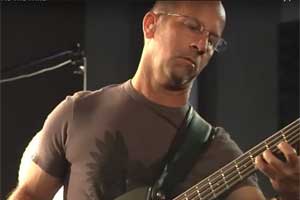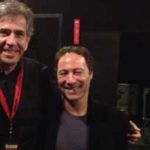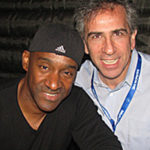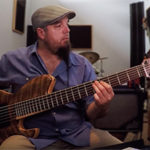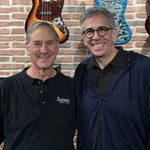Studio vet has played bass for everyone from Kenny Loggins and Phil Collins to tons of film and TV soundtracks. Great insights on career, equipment and more.
Exclusive interview with FBPO’s Jon Liebman
March 12, 2012
Dave Marotta grew up in a musical family in Monterey, CA, the son of a music store owner. After college, Dave relocated to Los Angeles, where he became a fixture in the LA Studio scene. He has performed and/or recorded with Kenny Loggins, Burt Bacharach, B.B. King, Lionel Ritchie, Gino Vannelli, Phil Collins, Carl Verheyen, Manhattan Transfer, Bruce Hornsby, David Benoit, Neil Diamond and many others.
Dave has played bass on the soundtracks of many TV shows, including Boston Legal, Home Improvement, Happy Days, Knots Landing, Ally McBeal, The Young and the Restless, Dharma & Greg, Disney Sunday Night Movie, and CSI Las Vegas, as well as many motion pictures, including Anger Management, Eight Crazy Nights, The Longest Yard, Deuce Bigalow, Blow, What Happens in Vegas, and many others.
Dave Marotta uses Music Man basses, Ernie Ball strings, Markbass, amps and the popular Basswitch DI/pre-amp, manufactured by Ruppert Musical Instruments.
FBPO: Tell me a little about your musical upbringing. Your dad owning a music store no doubt exposed you to lots of music very early.
DM: From the age of 5, I started playing the accordion and switched to guitar at age 8. I studied classical guitar till I was 13, then switched to bass. Every day after school, I would walk to my Dad’s music store and polish guitars, change tubes or do anything that needed to be done, including cleaning the toilets!
My Dad was on the board of directors for the Monterey Jazz Festival, so I was always exposed to great musicians that would come to Monterey. They would stop by the store and all these jam sessions would take place. I just took it all in. We had a great teaching staff at the store, too, so I got to study with a wide variety of players.
FBPO: What attracted you to the bass?
DM: I went to every show at the Monterey Pop Festival. My Dad’s Store, ABC Music, supplied the backline, which my brother and I humped to the venue! At that time, I was struggling with trying to switch from classical to electric guitar. At the Pop festival, hearing Duck Dunn with Otis Redding and Noel Redding with Jimi Hendrix just drew me to the bass. After the Pop festival, I brought home a Rickenbacker bass from the store and have played bass ever since. I discovered that my classical guitar technique for the right hand worked naturally on the bass.
FBPO: How did you manage to break in to the LA studio scene? I mean, that’s a pretty tall order.
DM: I struggled in Los Angeles, just like everyone else, before going on the road with the Mark-Almond band from England. After that tour, I got the gig with Gino Vannelli for the Brother To Brother tour. At that time, Gino was a highly-respected artist and had a huge hit, so being in his band was a great calling card when we finished the tour. Calls just started coming in. I was fortunate to have Neil Stubenhaus recommend me for sessions. Also, John Ferraro, the great drummer, helped me out a lot. There was lots of TV work at the time, so there were enough opportunities to break in.
FBPO: What advice do you have for the young, up-and-coming bassist with dreams of being a session player? Things are so different now than when you were coming up. Aren’t those days pretty much gone for good?
DM: These days, I would say it is nearly impossible to make a living just as a session musician. I think to be successful as a session musician, one has to be a jack of all trades and a well-listened musician. One has to be proficient, not only on their instrument, but also in production, engineering and writing. You also have to be open to performing in many different musical venues. Being a doubler is an added benefit. Having a home studio could also generate some work, as there is a lot of recording done these days over the web.
FBPO: Tell me about your equipment.
DM: I have a good cross-section of basses and amps that can cover just about any call. The list includes everything from old Fenders to Hofners, a Sadowsky and my ever-growing collection of Music Man basses, which are my go-to instruments. My main studio bass is a Music Man 5-string 25th Anniversary model and my live basses are Bongos and Big Al 5s. Music Man is a great company to be associated with and they are pushing the envelope continually with the new Cobalt strings and the Gamechanger. For amps, I use MarkBass. I favor the MoMark system, which allows you to change out the modules. I also use an F500 for travel dates. It’s so small, but it packs a huge punch! I have two of the MarkBass combo amps and love them. I use a MarkBass 4×10 cab for smaller gigs and add a 2×10 Traveler for larger gigs. MarkBass is another company that continually comes up with new products that serve the working musician really well. Plus, they are Italian! My people! I also have a 1960 Ampeg B15 that sounds incredible, as well as some Schroeder cabinets that always sound great.
FBPO: I saw a demo of the Basswitch IQ DI bass preamp at the NAMM show and was blown away. What made you decide to endorse it? How does it compare to other direct boxes and bass preamps?
DM: I actually have two Basswitches. One is mounted in my pedalboard and the other is my stand-alone DI for sessions and live gigs when I don’t use the pedalboard. First and foremost, the Basswitch is very transparent, which is my first priority in a Direct Box. I want to hear each of my incredible instruments without color and the Basswitch does that and more. There are great DIs available that are transparent, but they are just one-trick ponies. The Basswitch acts as the control center for my pedalboard and also has a boost circuit, which I find is useful when it’s time for a feature or solo. It has a serial loop or a mix loop, depending on how you want to run your pedals. Also, being able to switch between two basses is a great feature. The proven Lehle switches are noiseless and the unit is built with the highest quality components. Jacques Ruppert, the creator, is passionate about building a product that not only sounds great, but will last for years.
FBPO: So you use the Basswitch not just in the studio, but during live performances too?
DM: Yes. Our front-of-house mixer fell in love with it the first time I brought it to a live performance. Engineers love it when the signal they get is of the highest quality. For me, I know that my sound and tone are getting to the console. On one live gig, we had Marcus Miller’s mixer working with us. He was also very impressed and ultimately showed it to Marcus, who now uses it in his pedal board. It’s just a great product!
FBPO: What else is keeping you busy these days?
DM: I work with guitarist Carl Verheyen and drummer Walfredo Reyes. We have a new live CD and we will be touring the East Coast at the end of March. We’ll also be doing a tour of the Northwest in June, followed by a tour of Europe in the summer and fall.
FBPO: What about the future? What else would you like to do that you haven’t already accomplished?
DM: I look forward to the future. I think I am playing better than ever and look forward to new collaborations with other like-minded musicians.
FBPO: What would you be if you weren’t a bass player?
DM: I would do something in the area of designing or building. I’ve been an avid woodworker for many years and have studied design, so I would most likely gravitate to those areas.
